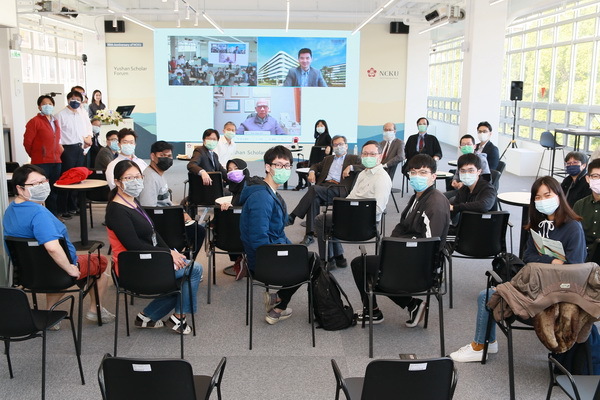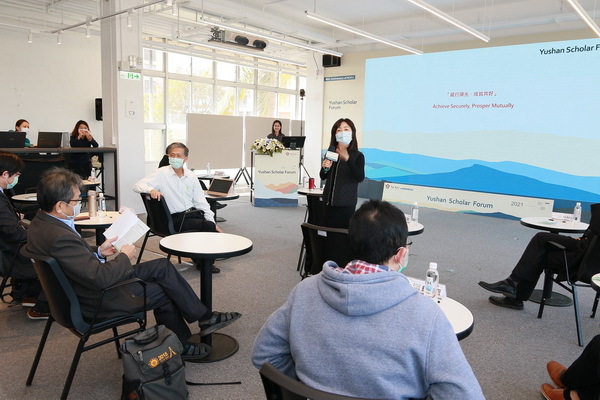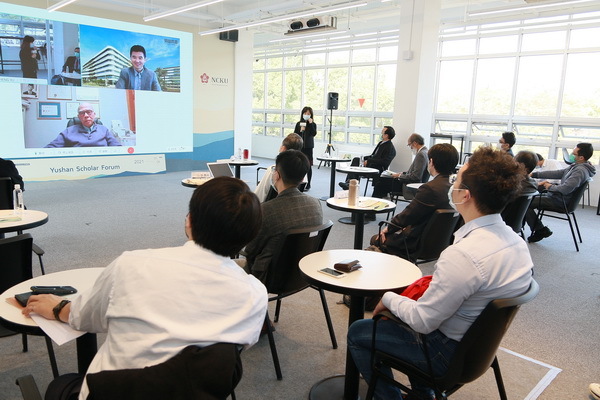Distinguished Scholars Share Cross-Field Knowledge in NCKU Yushan Scholar Forum
Writing by Hsu Tsu-yueh. Photo by Chen Hung-Jui.

Yushan Scholar Forum transcends the limitations of expertise to foster academic communication
As part of National Cheng Kung University’s preparations for its 90th anniversary, it hosted the Yushan Scholar Forum on January 20th to foster academic communication. Seven Yushan Scholars were invited, transcending the limitations of borders, age, and expertise, to share their research results. Dr. Huey-Jen Jenny Su, President of NCKU, expressed in her welcome remarks that the past year had brought many challenges to NCKU, but the school has managed to maintain its vibrancy and resilience.
Stepping into the first month of 2021 signifies the entry of NCKU into its 90th anniversary, Dr. Su pointed out. It was an honor for NCKU to witness Yushan Scholars gathering to share their academic knowledge, from which everyone can be encouraged to excel and pursue better and more advanced academic performance. Through collaborations across different fields of expertise, higher education can cultivate academic talent for the future.

President Su encourages participants to engage in cross-disciplinary communications
The seven Yushan scholars, whose expertise spans across medical humanities, political science, medical technology, information engineering, materials sciences, chemical engineering, and photonics, participated in the NCKU Yushan Scholar Forum to give speeches on their fields of expertise. NCKU Department of Political Science Assistant Prof. Ching-Hsing Wang, in his speech titled, “Analysis of Legislators’ Social Media Activities: Evidence from Taiwan,” said his study showed that Taiwanese district legislators contribute more Facebook posts than party-list legislators due to the former’s pressure to connect with local constituents, while party-list legislators tend to make more posts related to law-making.
District legislators are facing electoral pressure in the current era of social media, Assistant Prof. Ching-Hsing Wang pointed out, and are therefore motivated to host Facebook fan pages or Instagram fan pages to interact with local residents. On the other hand, party-list legislators focus more attention on law-making and policy debate because of their connection with their respective political parties.

International scholars shared their research results via online conference
NCKU Department of Chemical Engineering Assistant Prof. Chung-Wei Kung introduced the advantages of metal-organic frameworks (MOFs) in his speech titled, “Electrochemistry Meets Metal-Organic Frameworks.” “MOFs, given their regular porosity, ultrahigh specific surface area, and periodic intra-framework functionality, are being considered desirable thin-film materials to deposit on electrode surfaces for various electrochemical applications, including electrocatalysis, electroanalysis, and energy storage,” explained Assistant Prof. Kung.
NCKU Department of Materials Science and Engineering Assistant Prof. Sheng-Heng Chung explored the possibilities for future batteries in his speech titled, “Electrochemical Reaction and High-Energy-Density Batteries in Sulfur Chemistry.” Assistant Prof. Chung said that the key to the next generation of batteries lies in energy-storage and energy-conversion. Currently, the research team is dedicated to developing lithium-sulfur batteries and fuel cells and has published more than 50 peer-reviewed papers and has also acquired several patents. The future generations of batteries will be cheaper and will be able to operate at a longer distance or for a longer period of time. In five years, the new batteries are expected to be popularized, and by 2050, they are expected to take up 40% of the market.
NCKU Department of Photonics Assistant Prof. Pin-Chieh Wu gave a speech titled, “The Future of Optical System – High-performance Nanophotonic Metasurface for Light Management.” In the speech, Assistant Prof. Wu presented the findings in his study, “Metasurfaces have great ability to control optical properties and wavefronts at a subwavelegngth scale and thus are suitable for various flat optical applications, such as compact spectrometer and low-profile spatial light modulator. The characteristics of optical metasurfaces for phase modulation, amplitude control, and dispersion engineering enable applications focusing on metalens and achromatic metasurface devices.”
Due to the pandemic, some of the scholars shared their research results via video call, demonstrating the academic spirit to connect across borders and expertise. “The imminent smart world era requires massive, heterogeneous, and ubiquitous wireless connectivity,” NCKU Department of Computer Science and Information Engineering Visiting Chair Prof. Quee Seng Quek mentioned in his speech titled, “Road to 5G and Beyond Wireless Systems.” Conventional terrestrial base stations are inadequate to meet the requirements of future data demand and diverse quality of service, therefore, the future generations of wireless networks beyond 5G will have to come from technological breakthroughs. “The 5G and beyond wireless systems are foreseen to integrate low-orbit mega-satellite constellations, high altitude platforms (HAPs), and unmanned arial vehicle (UAV) BSs into the network architecture.” Prof. Quek said, “The rigid architecture of conventional networks is migrating to flexible cloud and fog architectures with intelligent network recourse management and mobile edge caching and computing capabilities.”
Assistant Prof. Harry Yi-Jui Wu, Director of the University of Hong Kong Medical Ethics and Humanities Unit, told the story of Taiwan’s medical history as a “missing link” on the world map in his speech titled, “Positioning Taiwan in the global health history: Looking to the past and looking ahead.” Emeritus Prof. Kai-Nan An, from Mayo Clinic Department of Orthopedic Surgery in the U.S., expressed that medical science and technologies have advanced tremendously, and that integration of such technologies can be applied to advance disease prevention, diagnosis, and therapeutic treatments.
Provider:
News Center
Date:
2021-02-01




